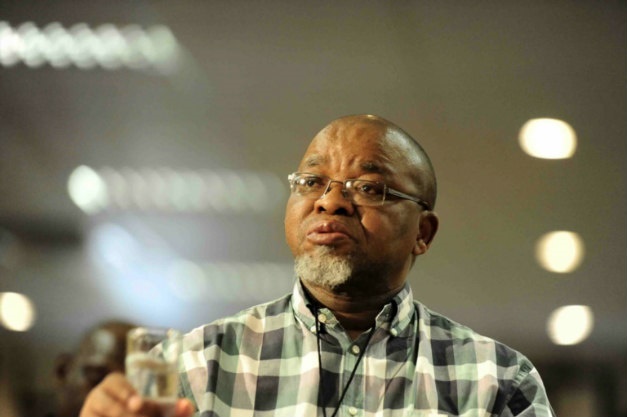
Mineral Resources Minister Gwede Mantashe lectured mining executives at the Joburg Indaba this week about the importance of being good ambassadors when they speak about South Africa. "If you badmouth the country," he said, "you are destroying your own investments."
President Thabo Mbeki once expressed similar sentiments when he berated Anglo American CEO Tony Trahar for suggesting political risk in South Africa had not disappeared. "I think the South African political risk issue is starting to diminish – although I am not saying it is gone," Trahar had said.
Mbeki reacted angrily. "When foreign business people have told us about South African business people badmouthing our country, was this what they were talking about?" he wrote in his acerbic weekly column in 2004. Mbeki felt that people like Trahar did not appreciate the political stability brought by the ANC government and the macro-economic policies favourable to business. Mbeki had a point.
But one wonders how Mbeki felt when Trahar was proven correct soon after the former left office. Under Jacob Zuma's administration, the mining industry faced the worst political uncertainty post-1994.
Relations between government and the sector had deteriorated to the point that the Minerals Council of South Africa (formerly the Chamber of Mines) took the unprecedented step of declaring a vote of no confidence in Zuma's mineral resources minister, Mosebenzi Zwane. In international investment platforms, South Africa's mining executives were speaking out openly about the political risk associated with policy flip-flops and state capture in South Africa.
Mantashe said the period of uncertainty was over. The industry should trust his policy reforms that would bring certainty, attract investment and ensure that profits are shared among stakeholders. The Mining Charter he released after a lengthy consultation process with the mining sector would achieve just that.
It was music to the ears of the mining executives. Roger Baxter, chief executive of the Minerals Council of South Africa, remarked that the industry appreciated working with someone who understood mining. Mantashe is a former mine worker and trade union leader in the sector.
After listening to Mantashe, I heard the shocking testimony of Finance Minister Nhlanhla Nene at the state capture commission inquiry. His testimony revealed the extent to which under Zuma's administration, political risk was not only about policy uncertainty. Zuma himself posed a sovereignty risk to the country.
The details of how Nene was pressured by Zuma to sign the nuclear deal with Russia, regardless of the financial implications for South Africa, was breathtaking. The fact that his refusal to budge raised the ire of not only Zuma but other Cabinet colleagues who were willing to sell South Africa to the Russians so that the Guptas could have a thriving uranium mining operation is disgusting.
Here is the president of the republic willing to sell our country to foreign interests – Russians (state) and Indians (private individuals). It didn't end there: he also wanted to bankrupt South Africa by forcing state-owned enterprise Petro SA to pay a ridiculous sum for Engen from the Malaysian state-owned company Petronas without due process.
The state capture commission of inquiry must probe conclusively what else was at stake for Zuma on the Russian deal beyond making the Guptas – and by extension his family (through Duduzane) – wealthy at the expense of South Africa. The truth must come out. What other symbiotic relationships were being forged or were established during that process?
It is easy to understand what was at stake for Russia's president Vladimir Putin. He is pursuing a grand geo-political strategy that would project Russia's might. A nuclear power station on the southern tip of Africa would project Russian power over Africa in ways unprecedented since the end of the Cold War.
In Zuma Putin had found an unsophisticated president presiding over a sophisticated economy. It's not clear whether Putin understood the other aspects of South Africa as a constitutional democracy with checks and balances or whether Zuma told him these don't matter because he could do as he liked.
With the well-documented history of corrupt and unaccountable leaders in Africa, it would have been easy for Putin to believe Zuma's lies that he had absolute power. Each time Zuma reshuffled Cabinet, it's likely that Putin believed Zuma had power and a deal was about to be clinched. That there was a court process to force government to have a transparent bidding process as envisaged in the Constitution didn't seem to matter to Zuma and Putin.
In fact, as recently as a few weeks ago, Zuma made it clear how contemptuous he was towards South Africa's constitutional democratic system. He favours a majoritarian system. We know why. Under a majoritarian system, he would have signed the Russian deal, sold South Africa and no court or public protector would challenge him for as long as the ANC had its majority in the National Assembly.
Such is the extent to which Zuma was a risk to the country. Instead of telling the world about our wonderful constitutional democratic system, he was forcefully attacking it practically and in the way he spoke to the likes of Putin because it didn't serve his personal interests. It is no wonder that even after Zuma's removal from office, Putin enquired about the nuclear deal on the sidelines of the Brics meeting held in South Africa.
It is safe to say that during his presidency, Zuma was the most powerful "bad-mouther" of South Africa's constitutional democracy which, ironically, enabled him to be president.
- Mkhabela is a political analyst with the Department of Political Sciences at the University of South Africa.
Disclaimer: News24 encourages freedom of speech and the expression of diverse views. The views of columnists published on News24 are therefore their own and do not necessarily represent the views of News24.




 Publications
Publications
 Partners
Partners






















